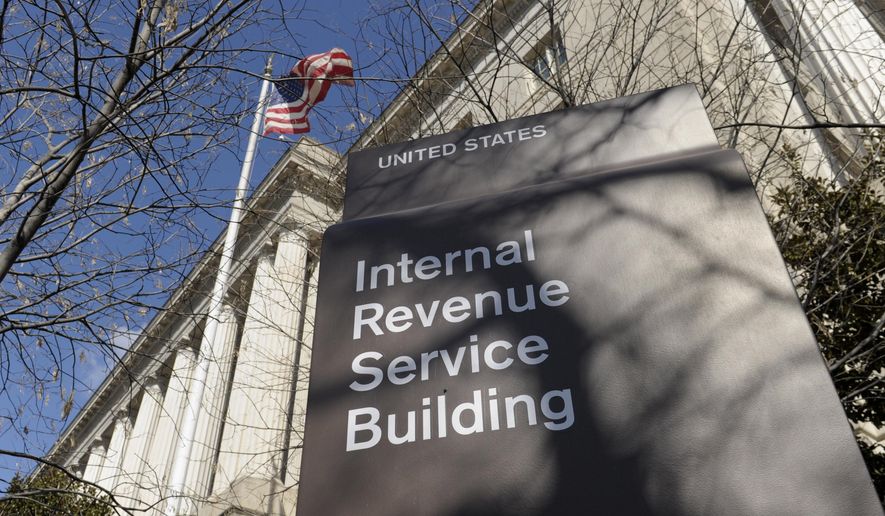Congressional Democrats were forced to retreat Tuesday from a plan to give the IRS access to bank information on customer accounts with more than $600 in annual deposits or withdrawals after widespread backlash from the public and the financial industry.
Senior Democrats on Congress’ chief tax-writing panels announced a revised version of the proposal that raises the monitoring threshold from $600 to $10,000 in annual account activity. The change means financial institutions will have to report to the IRS on any account with more than $10,000 in deposits or withdrawals annually.
Treasury Secretary Janet Yellen said the change will help crack down on wealthy tax scofflaws and businesses that don’t report all of their income. But the low $600 limit quickly proved a major political headache for Democrats trying to find ways to fund President Biden’s multitrillion-dollar spending programs.
“At the core of the problem is a discrepancy in the ways types of income are reported to the IRS,” she said. “Opaque income sources frequently avoid scrutiny while wages and federal benefits are typically subject to nearly full compliance.”
Raising the reporting threshold was proposed after significant backlash from Republican lawmakers, the banking sector and voters. Critics have argued a threshold of $600 would essentially give the IRS unfettered access to how ordinary Americans spend their money.
Some Republicans say the proposal amounts to a massive expansion of federal power, comparable to that of a “surveillance state.”
“There is talk of watering this IRS reporting requirement down. That’s not good enough,” said Sen. Cynthia M. Lummis, a Wyoming Republican who serves on the Senate Banking Committee. “Weaponizing the IRS to spy on everyday Americans doesn’t work for me and doesn’t work for the people in Wyoming.”
Democrats are pushing for the regulations within President Biden’s $3.5 trillion, 10-year social welfare bill.
The revised proposal would officially require banks to report annually on the “inflows and outflows” of personal and business accounts. The reporting requirement would cover accounts with transactions above $10,000 annually.
There is also now an exemption from reporting requirements for “wage and salary earners” as well “federal program beneficiaries.” On paper, this means that accounts receiving paychecks or Social Security deposits of more than $10,000 annually would not be subject to the reporting requirements.
“Today’s new proposal reflects the administration’s strong belief that we should zero in on those at the top of the income scale who don’t pay the taxes they owe while protecting American workers by setting the bank account threshold at $10,000 and providing an exemption for wage earners like teachers and firefighters,” Ms. Yellen said.
Republican critics noted that the exemption covers only deposits and does not include how the money is ultimately spent.
Sen. Mike Crapo of Idaho, the top Republican on the Senate Finance Committee, said that means everyday citizens will be effectively be ensnared by the proposal even at the $10,000 threshold. He pointed to data from the Bureau of Labor Statistics showing “the average American” has more than $61,000 in financial transactions annually.
“The list goes on and on: health care, groceries, restaurants, entertainment, cash contributions, apparel clothing, education and personal care,” said Mr. Crapo. “The average American runs $61,000 through their account. … [They] will be picked up by this plan, and I think [so will] virtually every small business.”
Republican lawmakers also warned that the vague manner in which the proposed regulations are likely to be written means the reporting requirements will apply not only to banks but also to mobile money transfer systems such as Venmo and PayPal.
“The proposal doesn’t include just banks and credit unions,” Mr. Crapo said, “And the scope of the IRS to dive into these accounts will be the biggest violation of individual privacy that I think this country has ever seen.”
Democrats said the policy is needed to eliminate the “tax gap,” the difference between the amount owed to the federal government and the amount that reaches government coffers. The Treasury Department has estimated the shortfall in taxes collected from the top 1% of filers amounts to some $160 billion a year.
“Under the current system, American workers pay virtually all their tax bills while many top earners avoid paying billions in the taxes they owe by exploiting the system,” Ms. Yellen said.
• Haris Alic can be reached at halic@washingtontimes.com.




Please read our comment policy before commenting.